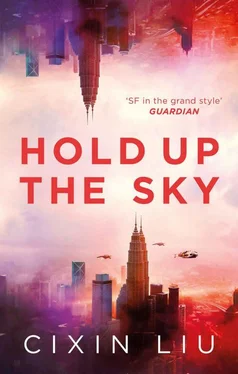Лю Цысинь - Hold Up the Sky
Здесь есть возможность читать онлайн «Лю Цысинь - Hold Up the Sky» весь текст электронной книги совершенно бесплатно (целиком полную версию без сокращений). В некоторых случаях можно слушать аудио, скачать через торрент в формате fb2 и присутствует краткое содержание. Город: London, Год выпуска: 2020, ISBN: 2020, Издательство: Head of Zeus, Жанр: Фантастика и фэнтези, на английском языке. Описание произведения, (предисловие) а так же отзывы посетителей доступны на портале библиотеки ЛибКат.
- Название:Hold Up the Sky
- Автор:
- Издательство:Head of Zeus
- Жанр:
- Год:2020
- Город:London
- ISBN:978-1-83893-763-8
- Рейтинг книги:4 / 5. Голосов: 1
-
Избранное:Добавить в избранное
- Отзывы:
-
Ваша оценка:
- 80
- 1
- 2
- 3
- 4
- 5
Hold Up the Sky: краткое содержание, описание и аннотация
Предлагаем к чтению аннотацию, описание, краткое содержание или предисловие (зависит от того, что написал сам автор книги «Hold Up the Sky»). Если вы не нашли необходимую информацию о книге — напишите в комментариях, мы постараемся отыскать её.
Hold Up the Sky — читать онлайн бесплатно полную книгу (весь текст) целиком
Ниже представлен текст книги, разбитый по страницам. Система сохранения места последней прочитанной страницы, позволяет с удобством читать онлайн бесплатно книгу «Hold Up the Sky», без необходимости каждый раз заново искать на чём Вы остановились. Поставьте закладку, и сможете в любой момент перейти на страницу, на которой закончили чтение.
Интервал:
Закладка:
“You’ve got it backward, Papa. If everyone were like us and spent all their life on exploring the universe, they’d understand its beauty, the beauty that lies behind its vastness and depth. And someone who truly understood the innate beauty of space and nature would never go to war.”
“That thinking’s as childish as you can get. If appreciation of beauty could prevent war, we’d never be short of peace!”
“Do you think it’s easy for humanity to understand this kind of beauty?” Misha pointed at the night sky, a sea of shining stars. “Look at these stars. Everyone knows they’re beautiful, but how many grasp the deepest nuances of their beauty? All these countless celestial bodies are so glorious in their metamorphosis from nebula to black hole, so vast and terrible in their explosive power. But do you know that a few elegant equations can accurately describe all of it? Mathematical models created from the equations can near perfectly predict everything a star does. Even mathematical models of our own planet’s atmosphere are orders of magnitude less precise.”
Marshal Levchenko nodded. “I can believe that. They say humanity knows more about the moon than the bottom of Earth’s oceans. But the deeper beauty in space and nature you talk about still can’t stop wars. No one could have understood that beauty more than Einstein, and didn’t he advise the creation of the atomic bomb?”
“Einstein made little progress in his later research, largely because he became too involved in politics. I won’t go down the same path as him. But, Papa, when it’s necessary, I’ll do my duty too.”
Misha observed the exercise for five days. The marshal didn’t know when his son first met Kalina; the first time he saw them together, they were already conversing on familiar terms. They were talking about stars, about which Kalina knew a considerable amount. Seeing an untried youngster like Kalina already wearing a major’s star for her Ph.D. left the marshal feeling a little offended, but other than that, she’d made a fine first impression.
The second time Marshal Levchenko saw Misha and Kalina together, he discovered there was already a deep sense of closeness between them. Their topic of conversation surprised him: electronic warfare. They were standing by a tank parked not far from the marshal’s jeep. Due to their topic of conversation, they didn’t seem concerned with privacy.
The marshal heard Misha say: “Right now, your department has been focusing on only high-level pure software like the C3I, virus programs, the digital battlefield, and so on. But have you considered that this might leave you holding a wooden sword?” Seeing Kalina’s surprise, Misha continued, “Have you put thought into the foundation they’re built upon? The physical layer at the bottom of the seven layers of protocol defined by the Open Systems Interconnection model? Civilian networks can use fiber optics, fixed lasers, and the like for media and communication. But the terminals in a military-use C3I network are fast-moving and unpredictably located, so only EM waves can keep them in communication. And you know how EM waves are as fragile as thin ice under jamming….”
The marshal was quite shocked. He’d never talked about these things with Misha, and his son would never have snuck a look at his classified documents, but here Misha had neatly and clearly laid out the same considerations that he’d come up with over the years!
Misha’s words had an even greater impact on Kalina. She even shifted the direction of her own research to create an electromagnetic jamming unit code-named “Flood.” It fit into an armored vehicle, and could simultaneously emit strong EM jamming waves ranging from three kilohertz to thirty gigahertz, drowning out all EM communication signals outside the millimeter radio range.
The first weapons test at one of the Siberian bases had sent a whole swarm of officials running over to protest. Flood had cut off all EM wave-based communication in the nearby city: cell phones found no reception, pagers fell silent, televisions and radios lost all signal. The impact on finance and stocks was disastrous; the local officials claimed astronomical losses.
Flood was inspired by a type of EMP bomb that utilized high explosives to create a powerful electromagnetic pulse within a one-use wire coil. As a result, Flood created shock waves like a rocket engine, shattering nearby windows in its trial. This meant that it could only be remotely operated, and its crew had to wear anti-microwave-radiation protective gear even though they were two or three kilometers away.
Flood had raised fierce debate in the armaments department and the electronic-warfare command. Many thought that it had no practical value; using it in a limited-scope battlefield would be like using a nuclear bomb in a street-to-street battle, devastating friend and foe alike. But under the marshal’s insistence, two hundred Flood units had been mass-produced. Now, in the central command’s new electronic-warfare strategy, it would take center stage.
That his son had fallen for a woman in the army had deeply surprised Marshal Levchenko. He assumed at the time that Misha’s feelings for Kalina overlooked her occupation. But Misha later brought Kalina home on a few occasions. The first time, Kalina wore a pretty dress; when Marshal Levchenko walked close, he overheard Misha tell her, “You don’t have to dress up for us. Wear your uniform next time, I know you feel more comfortable in it.” That disproved the marshal’s original theory. Now he understood that Misha fell for Kalina to some extent because she was a major in the army. He felt again what he felt that first morning of war training. The major’s star on Kalina’s shoulder now seemed incomparably beautiful.
Powerful electromagnetic waves gathered rapidly above the battlefield, at last becoming a mighty typhoon. After the war, people would reminisce: In the mountain villages far from the front line, they saw the animals fidget and stir, agitated; in the city with its enforced blackout, they saw induction trigger tiny sparks along the telephone wires.
As part of the Twelfth Army transferring from the eastern front to the west, the armored-car corps was advancing urgently. Their lieutenant general stood by his jeep parked at the roadside, watching his troops hasten through the snow and dust with satisfaction. The enemy’s air raids had been far less intense than predicted, allowing his forces to travel by day.
Three Tomahawk missiles tore overhead, the low buzz of their jet engines crisp in the air. A moment later, three explosions sounded in the distance. The correspondent by the lieutenant general’s side, his static-filled earpiece useless, turned to look in the direction of the explosion. He cried out in surprise. The general told him not to make a big deal out of nothing, but then a battalion commander beside him urged him to look, too. So he looked, and shook his head in confusion. Tomahawks weren’t 100 percent accurate, but for three to land in an empty field, more than a kilometer from each other, really was a rare sight.
Two Su-27s flew five kilometers above the battlefield in an empty sky. They had belonged to a larger fighter squadron, but it had run into a skirmish with a NATO F-22 squadron above the sea, and the planes lost contact with the others in the turmoil of battle. Normally, regrouping would have been easy, but now the radio was down. The airspace that had seemed so small as to be cramped to a high-speed fighter plane now seemed as vast as outer space. Regrouping would be like finding a needle in a haystack. The lead pilot and his wingman were forced to fly wingtip-to-wingtip like stunt fliers to hear each other’s wireless messages.
Читать дальшеИнтервал:
Закладка:
Похожие книги на «Hold Up the Sky»
Представляем Вашему вниманию похожие книги на «Hold Up the Sky» списком для выбора. Мы отобрали схожую по названию и смыслу литературу в надежде предоставить читателям больше вариантов отыскать новые, интересные, ещё непрочитанные произведения.
Обсуждение, отзывы о книге «Hold Up the Sky» и просто собственные мнения читателей. Оставьте ваши комментарии, напишите, что Вы думаете о произведении, его смысле или главных героях. Укажите что конкретно понравилось, а что нет, и почему Вы так считаете.











